Introduction
- The Vietnam War influenced Vietnam and America:
- The Viet Cong conflict with South Vietnam.
- The Tet Offensive attacks in 1968.
- The change of American public opinion.
- Rethinking of the worth of American Presidency.
- The role of media in the war.
In this presentation, the discussion of the impact of Tet Offensive on the United States and the role of media in military events will be discussed. The Vietnam War began at the end of 1955 and lasted about 18 years, involving more than 20 countries. The conflict between the Viet Cong and South Vietnam was supported by the United States because it was the only chance to stop the growth of communism in the world. The Tet Offensive was a remarkable event in the war that changed public opinion of Americans and provoked the necessity to rethink the correction of the President’s decisions and the role of media.
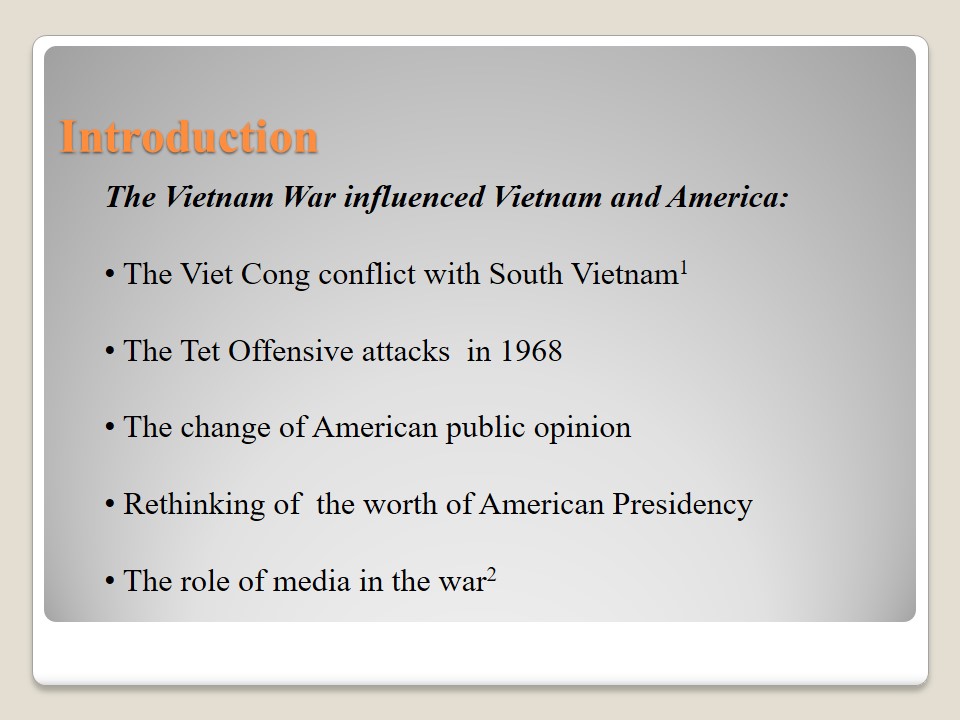
Reasons for Interest
- A thorough investigation of American history.
- Evaluation of media during the war.
- The analysis of American actions in Vietnam.
- Research about American Presidency’s military mistakes.
- A possibility to explore public opinion.
There are many reasons why the topic of the Tet Offensive is chosen for discussion in this project. First, it is a good opportunity to investigate a part of American history. Second, the impact of media and the coverage of military events is deeply evaluated. Then, the analysis of military actions taken by Americans to protect the citizens of South Vietnam is developed. Another significant cause is the necessity to identify and learn the mistakes made by presidential administration during the war. Finally, the reasons for public opinion change can be properly explored using credible scholarly sources.
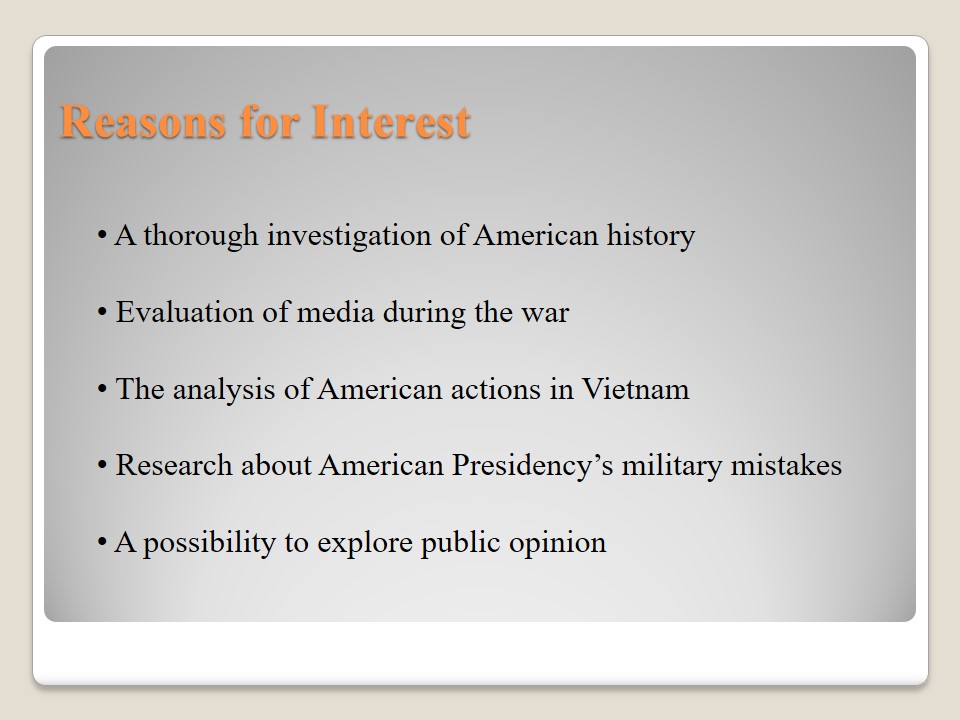
Thesis Statement
- The impact of the Tet Offensive.
- The US participation in the Vietnam War.
- The improvement of American domestic policies.
- The evaluation of US foreign policies.
- The worth of information provided by media.
- The change of public opinion about the war.
In this project, the following thesis statement is created: “The Tet Offensive had a significant impact on participants of the Vietnam War, which lasted more than 20 years and included more than 20 countries, but the outcomes for the United States and its foreign and domestic policies were the most crucial ones because the information provided by media changed public opinion and called into question the majority of statements made by the presidential administration.” It consists of six main points that have to be properly discussed:
- An overall impact of the Tet Offensive cannot be neglected;
- The reasons for the US participation in the Vietnam War have to be disclosed;
- The conditions under which US domestic policies were changed should be recognized;
- The necessity to re-evaluate foreign relations and policies will be mentioned;
- The worth of media coverage of military events must be revealed;
- Finally, the way of how public opinion about the war and the American presidency was change needs to be described.
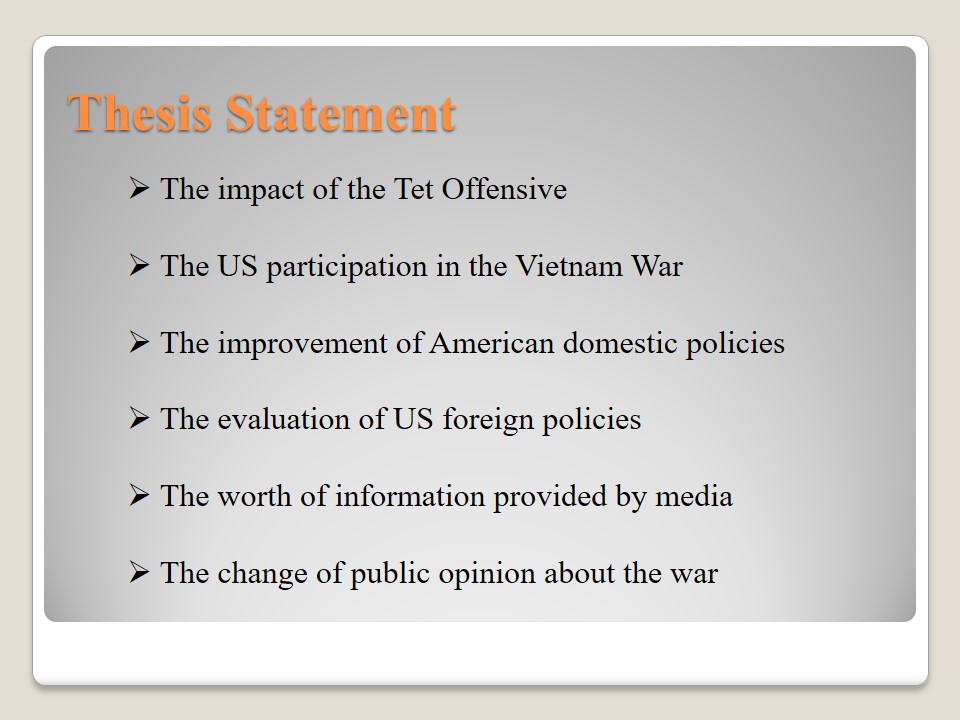
Tet Offensive Essence
- An unpredictable campaign began the Tet Eve.
- More than 100 cities were attacked.
- Guerrilla and army forces were used.
- No defense tactics were in North Vietnam.
- Three waves of attacks on the North occurred.
- 28 March 1968 was the end of the Tet Offensive.
The Tet holiday was one of the sacred days in Vietnam when peace was expected. However, North Vietnam began its attack on January 21, 1968, when neither the South Vietnamese army no US forces were prepared. In several hours, 100 cities in South Vietnam were attacked by guerrilla and army forces divided into full-time (regional level) and part-time (villages and defense). Due to the lack of defense tactics and the effect of surprise, North Vietnam failed to resist the power of the north and suffered from multiple losses and bloody outcomes. There were several waves of attacks, with the hardest in Saigon. South leaders arrested one of the north commanders, neglecting all ethical norms and respect. The US army gathered its forces and resisted the following attacks, ending the Tet Offensive on March 28, 1968.
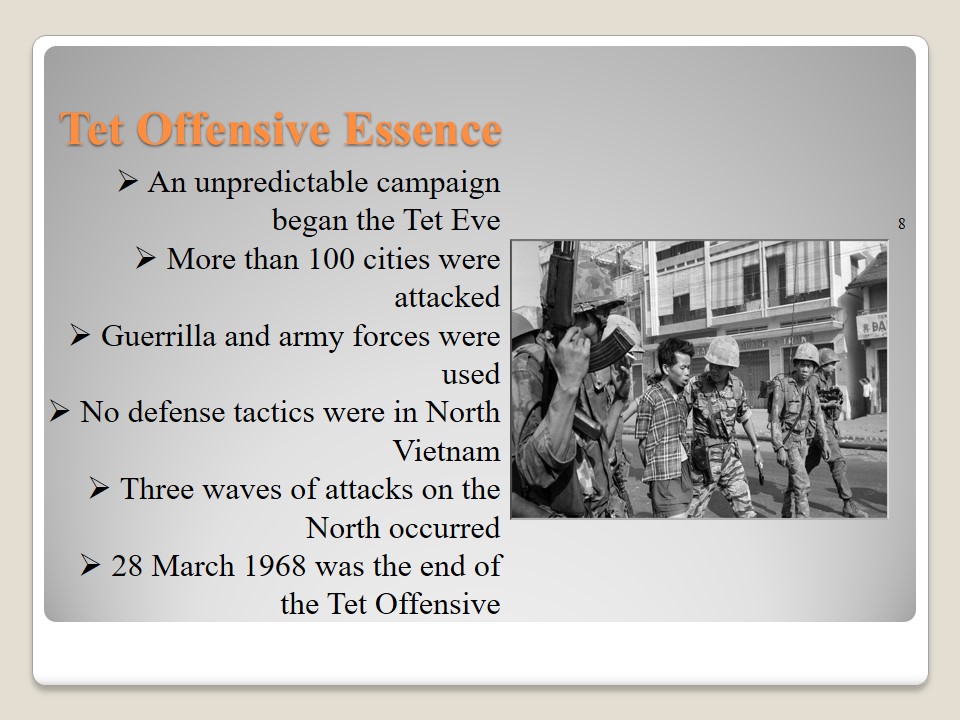
US Domestic Policies
- Deaths of many Americans during the attacks.
- Killings of innocent Vietnamese people by American soldiers.
- The necessity of new people to join the war.
- The economic crisis – dollar value rapid decline.
- Increased war-related costs in the country.
- Welfare reforms without evident people’s support.
The outcomes of the Tet Offensive provoked considerable changes in the US domestic policies. People were dissatisfied with the fact that many American soldiers died during the attacks. In addition, it was hard to predict the behaviors of local Vietnamese and their hostile attitudes towards Americans who possibly killed one of them. Finally, the government made new people join the military forces disregarding public discontent and unwillingness to follow this order because of the lack of available information. The results of such events cause new changes in domestic policies, including economic crisis because of the decline of dollar value, the increase in war-related costs that led to low salaries and high prices. Finally, the United States was in need of new welfare reforms that could hardly achieve positive results because of the lack of public support.
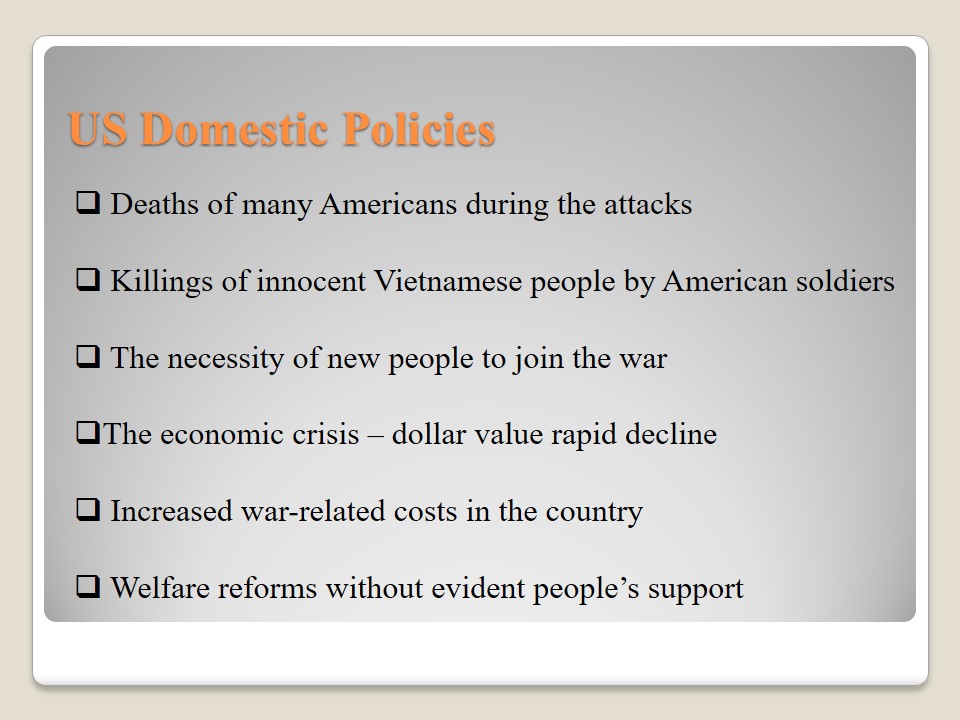
US Foreign Policies
- No clear reasons for joining the war.
- No desire of people to die in the war.
- Communism-related aggression in the world.
- The intentions to protect many nations.
- A serious threat to US security.
- The necessity to change the War direction.
Foreign relationships with the US were under threat after the Tet Offensive. It was hard to find out the reasons why people should join the war and lose their lives. The ideology of communism threatened many countries, and the US wanted to protect as many nations as possible. The President was afraid that the Tet attacks could seriously challenge the US security system. Therefore, it was important to change the direction of the war and find new allies to complete the mission.
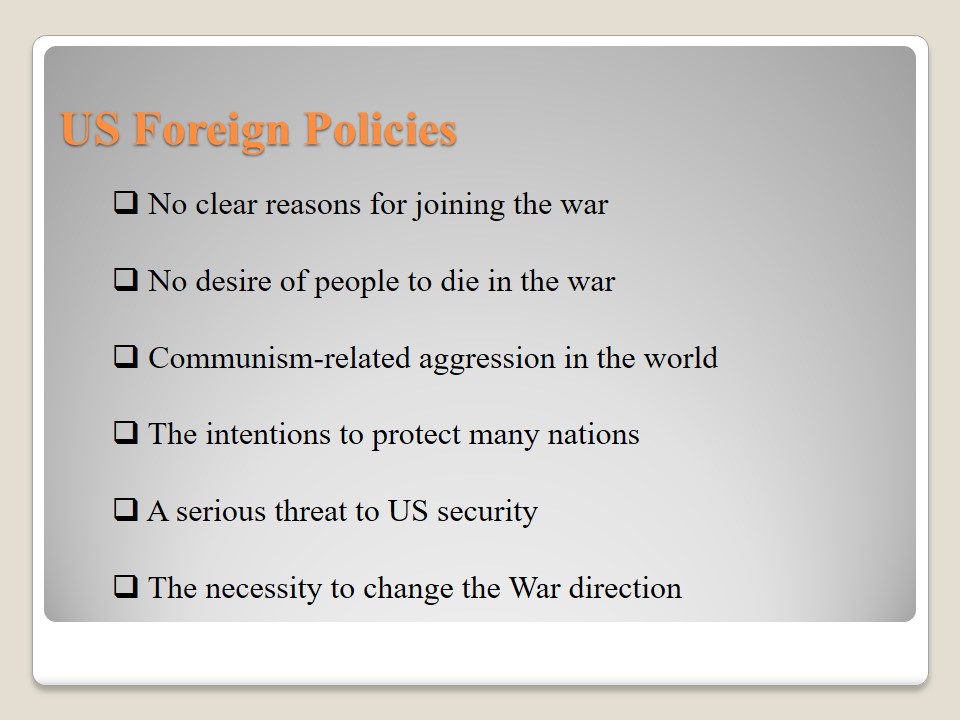
Media Effect
- Media informed people about the war.
- People wanted to know the details.
- Society trusted all the information offered.
- A twofold purpose of media:
- Inform people or support the government?
- Uncontrolled exchange of information took place.
During the Vietnam War, different media sources were used to cover the events from the battlefields. As a rule, people wanted to know more about what happened to soldiers and under which conditions they had to protect anti-communism ideas. Despite the intentions to trust all the information offered, it was hard to neglect a twofold purpose of media. On the one hand, it was necessary to provide people with enough information. On the other hand, it was forbidden to accuse the government of making serious tactic mistakes. President Johnson thought the press used only negative achievements and biased facts. However, the main threat was that the exchange of information was available to all people, including the enemies.
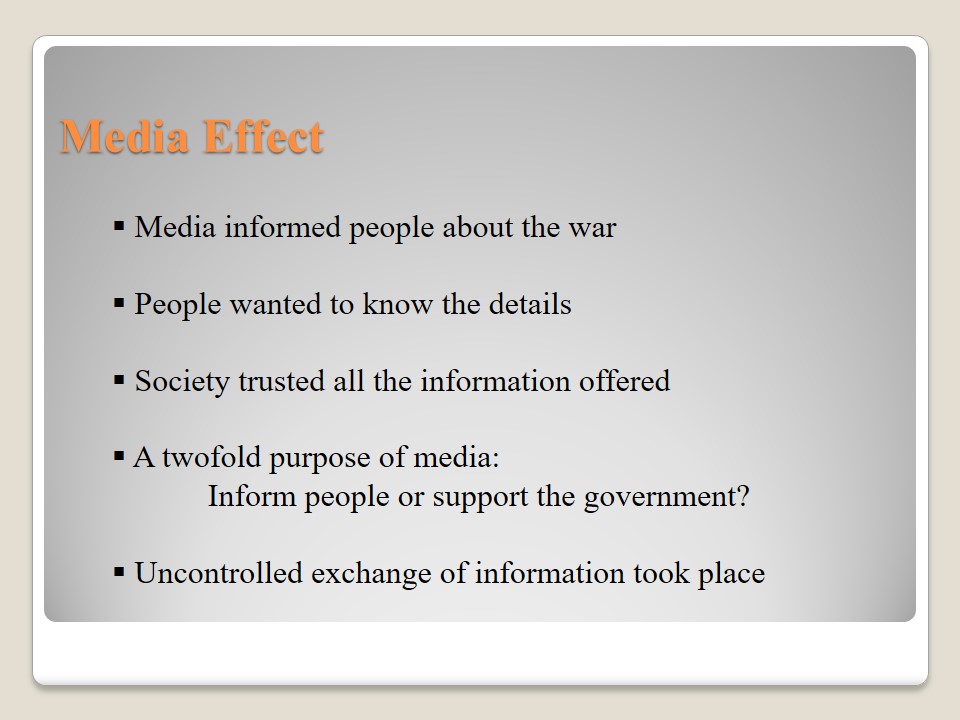
Rethinking of Media Impact
- Television opened eyes to existing violence.
- No fabricated images on TV threatened.
- Personal experience and true stories were revealed.
- The Tet Offensive was described.
- The Vietnam War was proved to be unnecessary.
In general, the impact of media on people during the wartime was impressive. Television helped open people’s eyes to what happened in Vietnam, and how serious violence was at that moment. True not fabricated images, personal experience, and real-life stories were revealed. Society got a chance to understand the essence of the Tet Offensive and realize that it is high time to question the participation of the United States in the Vietnam War.
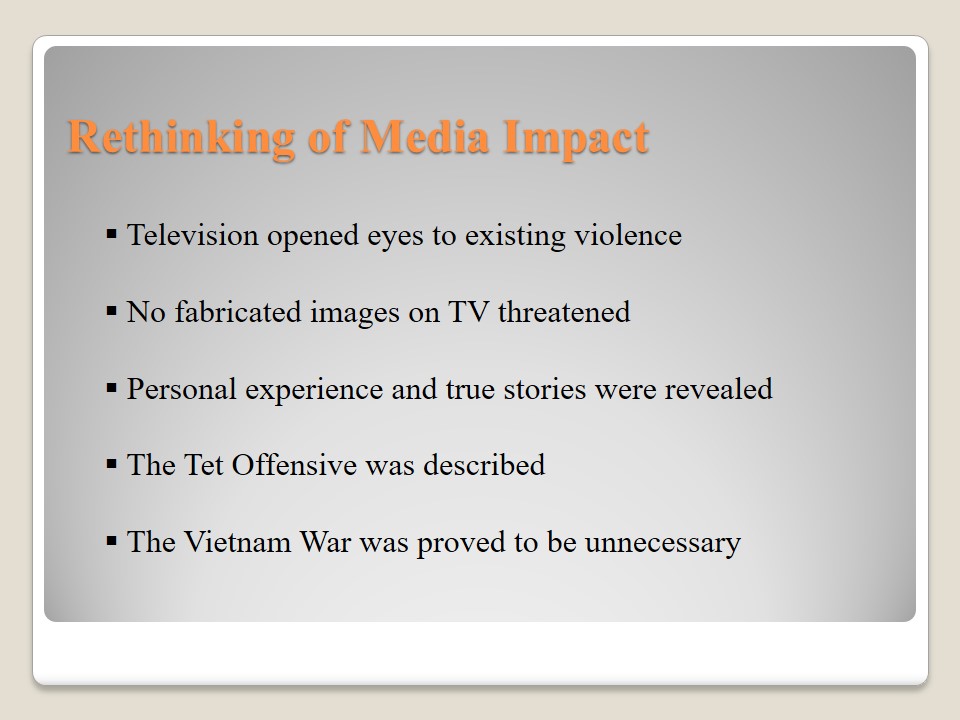
References
- David F. Schmitz, The Tet Offensive: Politics, War, and Public Opinions. (Lanham: Rowman & Littlefield Publishers, 2005), 5.
- Richard A. Hunt, Pacification: The American Struggle for Vietnam’s Hearts and Minds. (New York: Routledge, 2018), 209.
- “Johnson’s Defense of the U.S. Presence in Vietnam (1965),” Pearson Myhistorylab, 2009. Web.
- Lyndon B. Johnson, “Remarks on Decision not to Seek Re-Election,” UVA Miller Center, 1968. Web.
- Edwin Wentworth Kenworthy, “Congress Backs President on Southeast Asia Moves; Khanh Sets State of Siege,” The New York Times, 1964. Web.
- James J. Wirtz, The Tet Offensive: Intelligence Failure in War. (New York: Cornell University Press, 1991), 73.
- John Woodrow Cox, “A Vietnam War Photographer Captured the Bloody Tet Offensive. Fifty Years Later, the Bears Witness Again,” The Washington Post, 2018. Web.
- Eddie Adams, “South Vietnamese Forces Escort Suspected Viet Cong Officer Nguyen van Lem (also Known as Bay Lop) on a Saigon Street Feb. 1, 1968,” Pictures from History. Web.
- Henry Kamm, “Vietnamese Say G.I.’s Slew 567 in Town,” The New York Times, 1968. Web.
- Joel Achenbach, “Did the New Media, Led by Walter Cronkite, Lose the War in Vietnam?”, The Washington Post, 2018. Web.
- Arthur Herman, “The Tet Offensive Revisited: Media’s Big Lie,” National Review, 2018. Web.
- Douglas Brinkley, “The Sage of Black Rock,” American Heritage 62, no. 1 (2012), 65.
- Andrew Huebner, “Rethinking American Press Coverage of the Vietnam War, 1965-68,” Journalism History 31, no. 3 (2005), 150.
- David Culbert, “Television’s Visual Impact on Decision-Making in the USA, 1968: The Tet Offensive and Chicago’s Democratic National Convention,” Journal of Contemporary History 33, no. 3 (1998), 430.